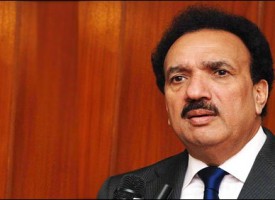Pakistan has always been one for keeping up with the Joneses. While a highly juvenile and soon to be obsolete way of conspicuous consumption, this pattern of spending and misplaced priorities seems to have grown to determine most of the country’s political agenda and foreign policy. It doesn’t matter if we’re liquid-asset poor, neck deep in debt and have to keep borrowing more just to keep the economy afloat; if the others have something that defines status, we have to scramble to get it too. And the neighbor we most look to as a benchmark for success is the political and economic giant to the East.
When it comes to stocking the artillery and launching a couple of nuclear programs, Pakistan is loath to stay behind the passive aggressive nation it happens to share a border with. The same goes for run-of-the-mill Idol shows and bridal couture fashion weeks. However, there is one major area that we have failed to take notice of when it comes to our shared socio-political landscape; and that is of governance.
While it would be a folly to consider the progress of India a yardstick for our own, the sphere of public administration is one where it would be smart to consider emulating some of the practices the neighboring state is beginning to adopt.
Previously, the culture of the Indian civil service was much like our own: too many liberties taken with the government’s time and money, and not enough work done to justify any of it. Narenda Modi is apparently a man with a plan, however. Being a hard worker himself, he has chosen to lead by example; and for those still not inspired, he has other ways of getting the job done.
Since being elected and coming into power earlier this year, the Indian prime minister has put in place stricter measures to ensure bureaucrats do what they have been hired to do. And that too to the best of their abilities, in the shortest time fame possible.
The Modi government has brought about a radical change in the way the country’s civil servants go about their job. The officials now face longer hours at their desks, having to clock in on time or face disciplinary action. The use of Biometric scanners to monitor the comings and goings of every person has also meant that no fake accounts of attendances will do.
However, the new found efficiency is not the result of just forcing people to show up and spend a couple of hours idling at the office. Key departments now have employees voluntarily coming in before time and going home around midnight; all due to the sheer amount of workload they are suddenly expected to deal with. Therefore, the longstanding practice of taking lengthy lunch breaks and slipping out for a quick round of golf will soon be unheard of. The weekends also seem to have merged into the work week as for many there is simply no time to spare for holidays.
If there is a file on the table, it has to be cleared within two days. And paper pushing is a thing of the past, with officials being encouraged to have greater intra- and inter-departmental communication to prevent files from simply going back and forth and causing undue delays. This is supposed to lead to less bogging down of issues in bureaucratic muddle, faster processing and hence an acceleration of national progress as a whole.
According to the Indian Ministry of Finance, the expenditure on the council of ministers and the Prime Minister’s own office under the Modi government will be down to almost half when compared to that of 2012-13. This is due to the cutting of the cabinet to half its size, and the restrictions placed on official foreign trips and the holding of meetings in five star hotels. With Modi in power, the taxpayers’ money is now in good hands.
Modi seems to be out to revolutionize the workings of the Indian government and the results are bound to be seen sooner rather than later. And while all these great changes are coming about in the neighboring country, our own leaders are very much preoccupied with matters that have very little to do with the actual running of the state.
Coming back to the point about spending a lot more than we actually have, Nawaz Sharif’s recent expenditures would have you believe we’re the wealthiest of nations with plenty to spare. Leaving behind the leaders of far more affluent states, he has been spending millions of rupees from the national exchequer to finance his own personal expensive tastes.
The current budget of the Prime Minister is a staggering 823 million rupees. And according to the Supplementary Demands for Grants and Appropriations 2013-14, the extra budgetary allocation given to him of 68 million has been put to good use. 16.4 million rupees have already been spent on the maintenance of the Prime Minister House. The office too has been redecorated for 12 million while more than a million rupees have been doled out to make the gardens more aesthetically appealing.
Besides landscaping his gardens and renovating his office, Nawaz Sharif also recently made some other grand purchases on behalf of the PML-N government. These include spending 2.4 million rupees on acquiring six sniffer dogs and 120 million on a pair of BMW-76 Li High Security Sedans.
It is actually argued that these specially trained canines are worth the excessive amount because of their superior lineage and extensive training, and are necessary for the security of the prime minister and any foreign dignitaries that come to visit. They are claimed to be a good investment because they’ll save us from the anarchy that will prevail if something were to happen to the prime minister. They will also be around for the protection of whoever comes in power next term, and so cannot be considered a private expenditure on part of Nawaz Sharif.
These arguments hold no merit of course, as there are already more than sufficient security measures in place for the government, and a couple of pups won’t be enough to reassure foreign delegations of their personal safety. In any case, the extravagance of this move cannot be justified by any stretch of the imagination in a country where there is widespread poverty and a presently especially dire IDP situation.
Ours is a state where many people have reason to fear for their lives on a daily basis, and not just because of security issues but because of disease, malnutrition and starvation. Over here, bullet proof vehicles and sniffer dogs make absolutely no sense to have.
And the most abhorrent news is that the money meant for emergency relief has instead been redirected towards the training of pilots who would carry out VVIP missions for Nawaz Sharif. 29 million rupees have already been taken out of the fund for this purpose.
The only message all these current expenditures seem to send out is that the lives of those at the top of the political hierarchy hold more worth than that of those at the grassroots. The common man can apparently do without the most basic amenities of life, but Nawaz Sharif has to have his trained dogs.
The Prime Minister seems to have taken a leaf out of the books of the Mughal emperors who lived on these same lands in much of the same way. They used to carry around a fragrant rose to mask the unpleasantness they were forced to witness when they ventured out of their high walled palaces for an occasional mandatory inspection of their kingdom. Our sovereign is however much more comfortable with the roses staying in his manicured lawns, as the tinted windows of his expensive four-wheelers already help to keep out most of the sickening poverty.
The difference between the leaders of Pakistan and India is clear. Modi is concerned with the welfare of his people and the overall betterment of the country; and will go to great lengths to achieve and ensure it. Nawaz Sharif, on the other hand, is currently too busy burying his head in a bed of roses like a privileged ostrich to notice much else.








It has always been a complicated topic because every nation has good and bad people. Instead of judging people based on their religion and faith, we should judge them based on their level of honesty. So if we could answer the following two questions, this could lead us to a better conclusion:
1) Are people of a nation honest with each other?
2) Are people of a nation honest with people of other nations (friends and enemies)?
Tum pakistaniyoon kitni kososh laro….Yahan ke bhole bhale Muslim ko behkaaane ki kitni koshish karlo …Hisdustan ka Musalmaan tumhari baaton meh nai aayega…PM Modi ne kaha hai ki Bharat ko uske musalmaaano pe Nazz hai …Hamare desh ka AB har ek nagrik chale woh Hindu ho ya Muslim …Aaaj ki tareeq meh tum pakistaniiyoon se zyada samajdhar ban chuka hai …Ab woh tumhari baatoon meh nai aayega ..Jo ab tak hota aaya hai Ab nai hoga …..Dharam ,Mazhaab ka jhuta Hawala deh kar tumhari Hukumat ,tumhari Army Pakistaan ki Avaam ko dhoka de rahi hai …Mere Pakistani Bhaiyoo Jaago
Glad to hear that Shiv (Sajid).
Some great words, Sajid Khan…I really liked it..It is the Pakistanis that have been influencing the innocence of Indian Muslims for their evil intents..I am glad to see someone speaking for our Muslims brothers!!
Indian ko gaali dene ki tumhari aukaat hai kya bhai
Allah ne muh de diya lage baap ko gaali dene
Baap ka matlab samjha na bhai…………….!!!!!!
but abi bhe india mepoor people pakistan se zyada hai ab bhe wahn log footpath pr soty hain aj bhe wahn achot logo ko mara jata hai muslim bhe save nhe hai big problem aariived in india every were
Dude who the hell taught you english???
thanks
India is a rich country ..Pakistani people understand this .stands third in military expenditure where as you stand 15th .well 15 is not but imagine if Pak and India could use this money to help their own citizen.India couldn’t use it because of Pakistan to much an extent since India never had intentions or will never invade any country .We are using military to defend our selves unlike Pakistan (training terrorist and infiltrating them into India)
shut up and stop blaming all terrorism on Pakistan, what about India… its not the Holy Country too, the most worst country in Asia who is anti Human is one and only INDIA… i repeat my words INDIA is the worst and anti human country in Asia continent.
India is providing all the weapons to people in Balouchistan to break Pakistan.
India is providing Bomb jackets and telling formulas to make bomb to talibans to kill as many humans as possible by doing bomb attacks.
Pakistan isn’t Terrorist we take care of humans because our religion is best and our religion don’t allow us to kill even one human even we can’t think to kill. while you grew up by listening that Pakistan is a terrorist country we need to finish it they are muslims they are terrorist.
shut up just shut up. stop pointing our Army again and again.
you always fire us we take it easy you kill our soldiers on the border we don’t even think to counter attack on you.
our Army and our intelligence authorities are on number 1 by the Grace of Almighty Allah.
we don’t need to cared of you people that what the fuck are you saying….
stop blaming us, see inside you; you will see terrorism in yourself too bloody Indian.
Lol.. U r dumb girl .. U Dont know anything about our country .. U ask anyone in this world is Muslims r innocent r not .. They will tell u … U Muslims r murders .. Done make fun… Leave it .. At last we r humans .. We will respect each other .. We will work for future .. They r more muslim in india. Than Pakistan .they r very happy .. Let us be a god ppl
Though I am an Indian but not want to argue with you on what you said and please do not take it as my acceptance to your views also. In India we, generally, do not compare our country with Pakistan and neither we feel in competition with Pakistan except in cricket matches. Both the countries were formed in late 1947 and since then both the countries have made history of themselves. Track records of both countries since 1947 is TOTALLY DIFFERENT. India is what India is today and Pakistan is what Pakistan is today. It is so different that comparison between these 2 countries is IMPOSSIBLE. The difference between these 2 countries will so much in future that it will be impossible to claim that “once upon a time these 2 countries were considered as one country”. I am happy to note from your post that you being a Pakistani is feeling proud of your country and my dear lady, I too being an Indian feel proud of my country but “without comparing it with your country”. Indian youth working hard to be at par with the scientific advances of the western world and feel interested in comparing India with the advanced western countries. India will not gain anything from fighting with Pakistan and so we never look at Pakistan for anything except a peaceful coexistence.
Nice writeup ma’am appreciations
from India
Good comparison of both leaders!!!
Jitna pakistan ka budget hota h utna to hindustan me bachhe mobile recharge krvate he
lol! Pakistan k Budget ka pta b hai tumhein kitna hota hai ? aa jatay hain shoshay chorney mu chukk k :/
Well,Everything You have written is true,The Thing is Pakistan Only Need a Good Leader,When We have People Like Jinnah in Parliament Pakistan Will be far ahead of India Because Pakistan has More Resources Than Any Country in The The World,The Only Problem is These Currupt Politcians!
the soul problum is you dont have any RTR type of government………also india…….we dont have RTR type gov. hence fear of conspiracy is still there that NM is cheating 125 crore population by just satvik show off.
mere pakistani bhai who told you that Pakistan has more resources than any other country in the world ???Bhai tere saath kisi ne bahut ganda mazak kiya hai ..tum log jab tak mazhaab aur kaatar panti aur Apne Bharat ki izzzat karna nai seekho ge (kyunki Bharat se hi Pakistan bana hai agar kuch history yaad ho toh)tab tak waise hi rahoge ya aur giro ge neeche..Mazzhab insaan ke dil ki shanti ke liye hota hai DESH BAAT ne ke liye nahi
Shiv ghatiya nasal ke kute